External links
| | This article about a music-related documentary film is a stub. You can help Wikipedia by expanding it. |
| Johnny Cash! The Man, His World, His Music | |
|---|---|
| Directed by | Robert Elfstrom |
| Written by | Robert Elfstrom |
| Produced by | Arthur Barron Evelyn Barron Roy Herkin |
| Starring | Johnny Cash Anita Carter June Carter Cash Helen Carter |
| Cinematography | Robert Elfstrom |
| Edited by | Lawrence Silk |
| Music by | Johnny Cash |
| Distributed by | Verité Production WJRZ Radio |
Release dates |
|
Running time | 94 minutes |
| Country | United States |
| Language | English |
Johnny Cash! The Man, His World, His Music is a 1969 American musical documentary film. The film examines Cash as he visits various locations in 1968, including his hometown of Dyess, Arkansas (in one scene, he plays the song "Busted" on acoustic guitar inside his abandoned childhood home). The film contains no narration, but rather contains audio and video footage of Cash playing in concert and talking with people on tour with him. By this point, Cash was married to June Carter and had been more sober than he had been in years, despite the fact that he still struggled with addiction. The film was released to capitalize on Cash's success by way of his At Folsom Prison album and to promote his upcoming television variety show on ABC.
The film was directed by Rob Elfstrom, with whom Cash would collaborate on his 1973 religious film The Gospel Road, which is shot in a similar style, using non-actors and is also filmed on location.
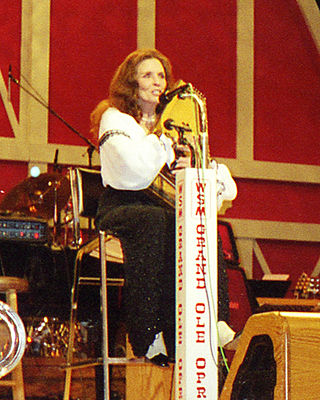
Valerie June Carter Cash was an American country singer and songwriter. A five-time Grammy award-winner, she was a member of the Carter Family and the second wife of singer Johnny Cash. Prior to her marriage to Cash, she was known as June Carter and continued to be credited as such even after her marriage. She played guitar, banjo, harmonica, and autoharp, and acted in several films and television shows. Carter Cash was inducted into the Christian Music Hall of Fame in 2009.

"A Boy Named Sue" is a song written by Shel Silverstein and made famous by Johnny Cash. Cash recorded the song live in concert on February 24, 1969, at California's San Quentin State Prison for his At San Quentin album. Cash also performed the song in December 1969 at Madison Square Garden. The live San Quentin version of the song became Cash's biggest hit on the Billboard Hot 100 chart and his only top ten single there, spending three weeks at No. 2 in 1969, held out of the top spot by "Honky Tonk Women" by The Rolling Stones. The track also topped the Billboard Hot Country Songs and Easy Listening charts that same year and was certified Gold on August 14, 1969, by the RIAA.
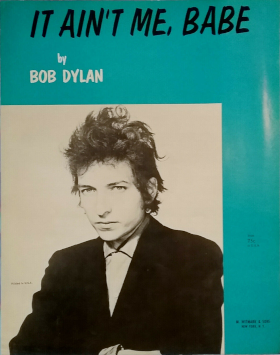
"It Ain't Me Babe" is a song by Bob Dylan that originally appeared on his fourth album Another Side of Bob Dylan, which was released in 1964 by Columbia Records. According to music critic Oliver Trager, this song, along with others on the album, marked a departure for Dylan as he began to explore the possibilities of language and deeper levels of the human experience. Within a year of its release, the song was picked up as a single by folk rock act the Turtles and country artist Johnny Cash. Jan & Dean also covered the track on their Folk 'n Roll LP in 1965.

Johnny Cash at San Quentin is the 31st overall album and second live album by American singer-songwriter Johnny Cash, recorded live at San Quentin State Prison on February 24, 1969, and released on June 16 of that same year. The concert was filmed by Granada Television, produced and directed by Michael Darlow. The album was the second in Cash's conceptual series of live prison albums that also included At Folsom Prison (1968), På Österåker (1973), and A Concert Behind Prison Walls (1976).
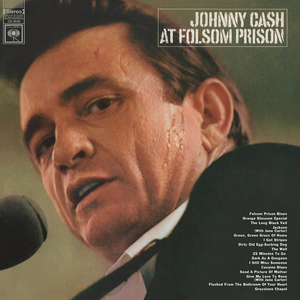
Johnny Cash at Folsom Prison is the first live album by American singer-songwriter Johnny Cash, released on Columbia Records on May 6, 1968. After his 1955 song "Folsom Prison Blues", Cash had been interested in recording a performance at a prison. His idea was put on hold until 1967, when personnel changes at Columbia Records put Bob Johnston in charge of producing Cash's material. Cash had recently controlled his drug abuse problems, and was looking to turn his career around after several years of limited commercial success. Backed by June Carter, Carl Perkins, and the Tennessee Three, Cash performed two shows at Folsom State Prison in California on January 13, 1968. The initial release of the album consists of fifteen songs from the first show and two from the second.

The Tennessee Three was the backing band for country and rockabilly singer Johnny Cash for nearly 25 years, providing the unique backing that came to be recognized by fans as "the Johnny Cash sound".
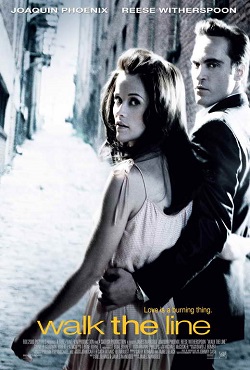
Walk the Line is a 2005 American biographical drama film directed by James Mangold. The screenplay, written by Mangold and Gill Dennis, is based on two autobiographies by the American singer-songwriter Johnny Cash: Man in Black: His Own Story in His Own Words (1975) and Cash: The Autobiography (1997). The film follows Cash's early life, his romance with the singer June Carter, his ascent in the country music scene, and his drug addiction. It stars Joaquin Phoenix as Cash, Reese Witherspoon as Carter, Ginnifer Goodwin as Cash's first wife Vivian Liberto, and Robert Patrick as Cash's father.
Luther Monroe Perkins, Jr. was an American country music guitarist and a member of the Tennessee Three, the backup band for singer Johnny Cash. Perkins was an iconic figure in what would become known as rockabilly music. His creatively simple, sparsely embellished, rhythmic use of Fender Esquire, Jazzmaster and Jaguar guitars is credited for creating Cash's signature "boom-chicka-boom" style.
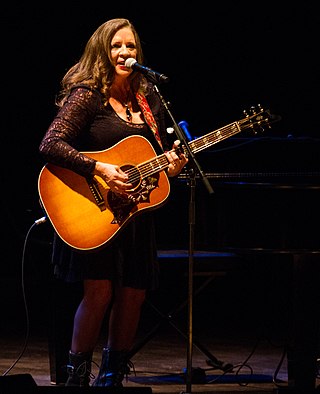
Carlene Carter is an American country music singer and songwriter. She is the daughter of June Carter Cash and her first husband, Carl Smith.

The song "Ring of Fire" was made popular by Johnny Cash after it appeared on his 1963 compilation album Ring of Fire: The Best of Johnny Cash. Written by Cash's eventual second wife, June Carter Cash, and songwriter Merle Kilgore, "(Love's) Ring of Fire" was originally recorded by June's sister, Anita Carter, on her 1962 album, Folk Songs Old and New.
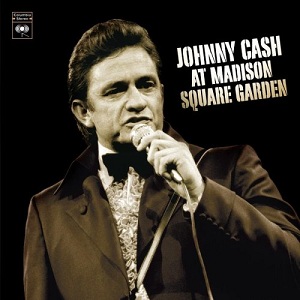
Johnny Cash at Madison Square Garden is a 1969 recording of a Johnny Cash concert at Madison Square Garden. It was released in 2002.

Orange Blossom Special is the 21st album released by musician Johnny Cash on Columbia Records in 1965. The recordings include country and folk standards, such as "The Long Black Veil", "When It's Springtime in Alaska", "Danny Boy" and "Wildwood Flower".

The Holy Land is a concept album, the third gospel album and 30th overall album by country singer Johnny Cash, released on Columbia Records in 1969. He recorded the album inspired by a visit to Israel with his wife, June Carter Cash and in fact most of the album consists of on-site recordings made by Cash using a portable tape recorder during a visit describing what he sees as he visits holy sites in and around Jerusalem. The remainder of the album consists of gospel songs. The album was completed at Columbia Studios in Nashville, Tennessee, where overdubs were added to some of the on-site recordings and remaining songs were recorded. This album features the final Cash recordings made with original Tennessee Two lead guitarist Luther Perkins before Perkins' death.

The Johnny Cash Children's Album is the 49th album by country singer Johnny Cash, released on Columbia Records in 1975, featuring recordings made between January 1972 and October 1973. As the title implies, it contains songs written for children. Among others, this includes "Tiger Whitehead", a song later released in an acoustic version on Cash's posthumous Personal File album in 2006. Most of the songs on the album had not been performed by Cash before. "Old Shep" had been performed by Elvis Presley, among others. One track recorded in 1972 was previously released on LP: "I Got a Boy " was first made available on the 1972 album International Superstar. It is a tongue-in-cheek duet between Cash and his wife, June Carter Cash, about their son, John Carter Cash.
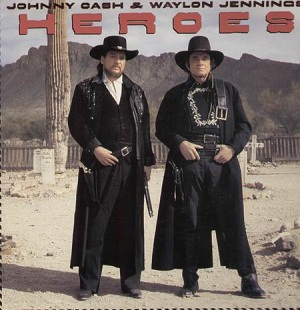
Heroes is a duet studio by American country music singers Johnny Cash and Waylon Jennings, released on Columbia Records in 1986.

Johnny & June is a compilation album and 60th overall album by American country singer Johnny Cash, released on Bear Family Records in 1978. Like The Unissued Johnny Cash it consists of material that was either unreleased or not widely available. Most of the songs were recorded from 1964 to 1965, with the exception of "Smiling Bill McCall" from 1960. The songs, "Cotton Picking Hands" and "Wer Kennt Den Weg" and "In Virginia" had been previously released on singles. "Thunderball" was recorded for the James Bond film, but was ultimately turned down in favor of Tom Jones.
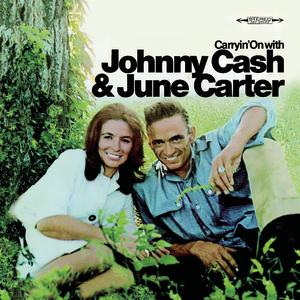
Carryin' On with Johnny Cash & June Carter is an album by Johnny Cash and June Carter released in 1967, on Columbia Records. The album consists exclusively of duets by Cash and Carter, including "Jackson"; "Long-Legged Guitar Pickin' Man" was also released as a single. One track, a cover of Bob Dylan's "It Ain't Me, Babe", dated back to 1964 and had previously been released on Cash's 1965 album, Orange Blossom Special.

The Johnny Cash Show is an American television music variety show that was hosted by Johnny Cash. The Screen Gems 58-episode series ran from June 7, 1969, to March 31, 1971, on ABC; it was taped at the Ryman Auditorium in Nashville, Tennessee. The show reached No. 17 in the Nielsen ratings in 1970.
The Great Eighties Eight was Johnny Cash's band during the 1980s. It was formed after longtime bass player Marshall Grant left the Tennessee Three, and Cash extended his band. The people and number of people changed frequently throughout the 1980s and by 1981 only seven people remained, making the band the Great Eighties Seven. This band was not as popular as The Tennessee Three, and did not have the fanbase that the original Tennessee Two/Three had enjoyed.
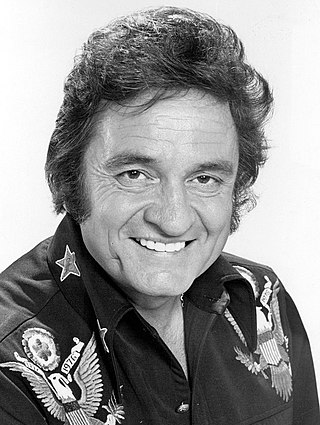
John R. Cash was an American singer-songwriter. Most of Cash's music contains themes of sorrow, moral tribulation, and redemption, especially songs from the later stages of his career. He was known for his deep, calm, bass-baritone voice, the distinctive sound of his backing band, the Tennessee Three, that was characterized by its train-like chugging guitar rhythms, a rebelliousness coupled with an increasingly somber and humble demeanor, and his free prison concerts. Cash wore a trademark all-black stage wardrobe, which earned him the nickname "Man in Black".